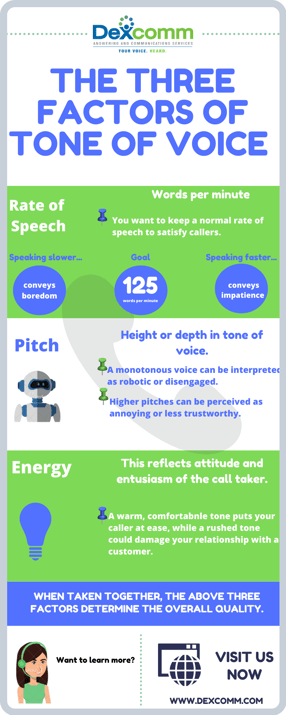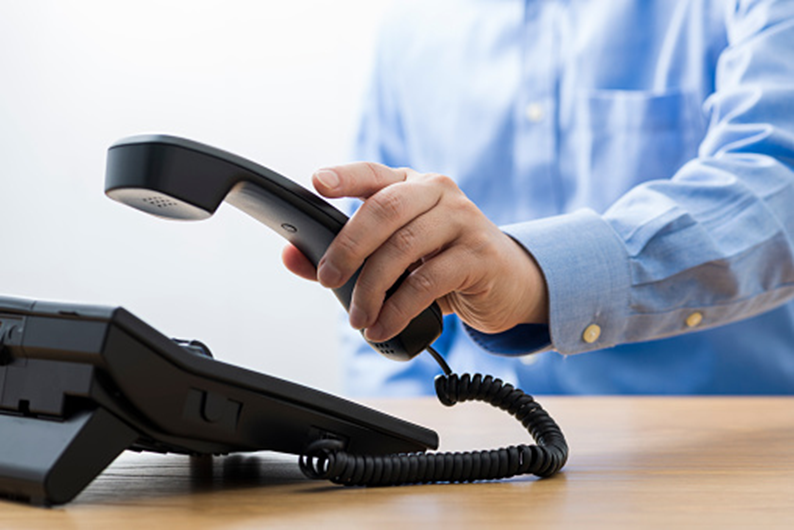When you and a co-worker are having a discussion, there is more to the conversation than what is being said. While most people are aware of body language, tone in communication, especially tone of voice, is an important supplement to body language and facial cues.
If you are having a rough start to your morning, others pick up on it. If you are feeling on top of the world after that first cup of coffee, same answer.
The reason for sending these social cues is that our brains combine the verbal clues we hear and non-verbal cues that we see to make sense of our conversations. This total picture helps us to dig deeper into what others are saying, even if they are trying to hide some aspects.
Consider these two examples:
Scenario 1: You ask your co-worker how their weekend was, and they abruptly say “fine”. Now based on their tone of voice, you know that they are most definitely not fine, and you can tell by their face that they’ve been crying. You can take these cues to ask more questions and offer comfort.
Scenario 2: You ask your coworker over the phone how their weekend was, and the pitch of their voice goes up, the speed of their speech slows, and the words seem to drop off when they finish speaking like they have less energy and force behind them. You did not have to see them crying. You heard it in their tone.
Importance of Tone of Voice
On the phone, where face-to-face interaction is impossible, (we mean traditional phones that you communicate with clients on, not FaceTime and similar apps) tone of voice takes on a significant importance. In fact, listeners glean emotion better from voice-only communications, according to Yale.
A defined tone of voice is essential in establishing clear communication between both parties. Here are two reasons why:
1. Your tone of voice projects what message you want the other person to hear when you speak to them.
A wide spectrum of messages can be conveyed through your tone in communication. Compassion and empathy are two important signals to a caller who is distressed, worried, or impatient.
2. Your tone of voice projects your company’s brand.
How you come across over the phone when communicating with a customer in the first 7 to 10 seconds establishes the impression that the caller will take away about your company.
You can come across as genuine and positive on a call by:
· Breathing into your stomach and not from your chest
· Smiling when you speak
· Speaking around 120 to 150 words per minute. Any slower of faster than this means you are likely not listening or do not come across as a good listener.
· Don’t take notes based on everything that is said. Writing every little detail means that you are not actively listening. We train our CSRs to take the “meat of the message”, meaning what is most important to accurately relay the message or input it into our client’s customer relationship management software or field service software.

Setting the Tone
Setting the stage for a positive call starts with a warm, comforting tone. This puts your customer at ease and increases the likelihood of the agent capturing an accurate and complete message. This is vital in industries where compassion and accuracy are essential, such as funeral homes or doctor’s office.
Tone of voice is comprised of 3 factors:
- 1. Rate of Speech: A normal rate of speech is 125 words per minute. Anything faster will seem rushed. And, a slower rate will impart a sense of disinterest and boredom, or worse-a feeling of condescension.
- 2. Pitch: Height or depth in the tone of voice. A monotonous voice can be interpreted as robotic or disengaged. Higher pitches can be perceived as annoying or less trustworthy.
- 3. Quality: The above three factors, when taken together, will determine the overall quality of tone of voice.
A telephone agent who is conscious of all four elements will have an easier time gaining call control and creating a professional engagement. The attitude conveyed by tone of voice will determine the outcome of the call, i.e., a frustrated customer or a happy, satisfied one.
Confidence is Key
A caller has only a person’s tone of voice and helpful attitude on which to base their opinion over the phone. A tone that displays confidence will have an advantage over a weak tone. Furthermore, a confident tone commands attention, gets interrupted less often, and is more likely to be considered a leader.
At Dexcomm, we like to call this controlling the call. Rather than talking over the caller or allowing the conversation to ramble aimlessly, the agent is trained to capture the essential information of the call and get that information to the correct party. This is important when you are relying on a call answering service to extend the professionalism of the business that you have worked hard to build.
This foundational training and confidence are nurtured through coaching with a supervisor or trusted peer. When you hear how you sound on a call and then walk through what you could have changed, you will create self-awareness and begin to see improvements in your call taking and the speed, pitch, and quality of the tone in your communications.
Did you know that how you dress can also impact the confidence you exude on a call? The term “Enclothed Cognition” was coined by Hajo Adam and Adam D. Galinsky to describe just such an impact. This could be why uniforms and wearing more professional attire in a call center or answering service lead to better call quality. We still know how to have fun, though! Casual Fridays to support our local teams, Carencro High School, University of Louisiana, Louisiana State University, or the New Orleans Saints, to name a few.
Compassion and Empathy Over the Phone
Because your company’s reputation is on the line, deciding who answers your calls is an important decision for your business.If your business is considering hiring an after-hours telephone answering service, or already works with a call center, you want to make sure the phone agents answering your calls are highly skilled and have received voice training.
A good place to start is their core values. Do they align with your company’s? Do they include compassion or empathy? Commmunicating with compassion is critical for your business.
A tone of compassion and empathy in communication means that you are engaged and builds trust. When you treat your callers and clients as partners, rather than an accounting entry, they will want to establish long term relationships with you. Relationships will outperform price every time.
Increasing customer retention by 5% can increase your revenue by 25% to 95%, according to Harvard Business Review.
Who wouldn’t want happier customers and more revenue? After all, the entire outcome of the call rests on the demeanor and tone of your phone agent. And the next call your business receives could be its most important one.

Editor's Note: This post was originally published in April 2017, but has been updated for accuracy and comprehensiveness by Marina Prestenbach.






